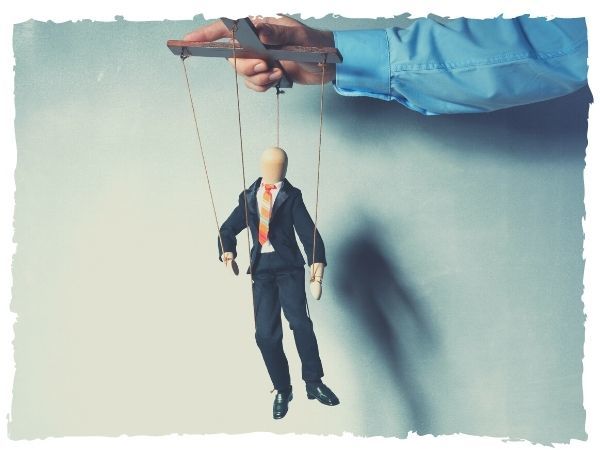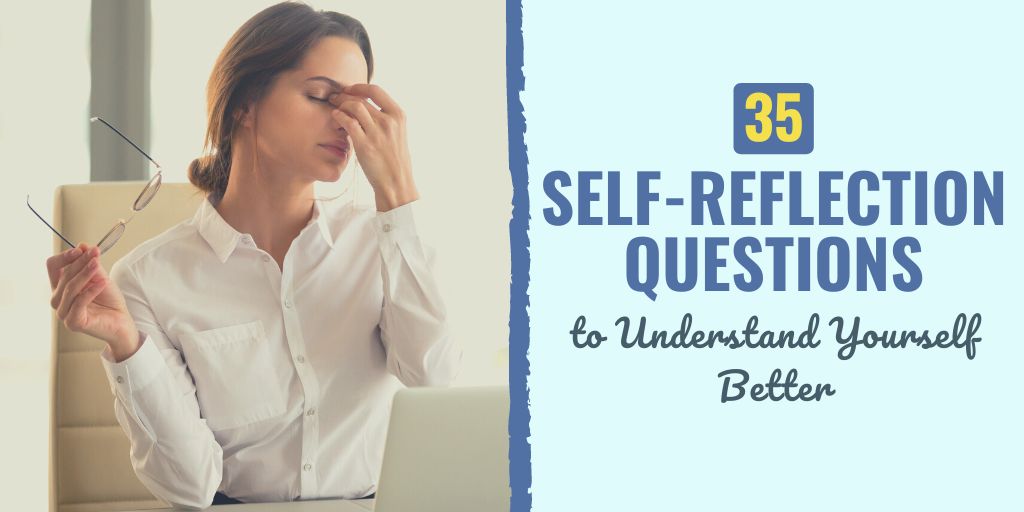One personal trait that I pride myself on is being mindful of having self-awareness.
Now, why am I not claiming to actually have self-awareness?
Research shows that even though 95% of people think they have self-awareness, only 10-15% of the population is actually self-aware.
And the truth is, we don’t know what we don’t know, so whether or not we actually have decent self-awareness may be more up to those who know us best. But, I can say that I am mindful of the importance of self-reflection and the part it plays in understanding myself better and I try to act accordingly.
But what really is self-reflection? Why is it important?
In this article, we are going to answer that and then go over 35 self-reflection questions to ponder to help you understand yourself better.
What is Self-Reflection?
Self-reflection is at the core of self-awareness. Engaging in introspection allows you to objectively and neutrally reflect on your thoughts, emotions, and behaviors and recognize how they align with your values.
You should be able to take a deep, curious look at yourself through this practice and come out on the other side with a comprehensive understanding of your thought processes, needs, and tendencies.
While it's good to reflect on your past, it's more beneficial to learn to use self-reflection in the present to improve your decision-making and behavior. If you notice your behaviors and your values aren’t working in unison, then you can make some changes so your life is a better fit with your standards.
For example, you might recognize that your job isn’t fulfilling, and you’re losing sight of your life’s purpose. When reflecting on your values, you realize that using your imagination and being innovative are both really important to you, but you’re lacking any type of opportunity to put this passion into practice.
This disconnect may lead you to change your behavior so you can pursue some more creative outlets to feel more satisfied with your life.
The ability to be introspective exists on a spectrum, with some people having higher levels of self-awareness, while others are unable to perceive themselves in this objective manner.
With a tendency to get defensive in the face of adversity, people turn to blaming each other or making up excuses in an attempt to avoid facing one’s own shortcomings.
Why is Self-Reflection Important?
People who self-reflect are able to turn off the auto-pilot in their brains and observe each situation they’re in independently from the next. Your ability to do this is directly related to your potential for success in life.
One reason this is true is because self-aware people can recognize when an opportunity or potential relationship is a good match, and what they can do to positively engage to make things work in their favor.
Self-reflection is important because when you have a comprehensive understanding of yourself, you’re able to identify what makes you unique from others.
This will empower you to make the necessary changes to become the person you want to be by building upon your strengths and realizing what areas of your life could use improvement. This can help you create goals that will ultimately make you into the person you want to be.
If you have a high level of self-awareness, you can manage your emotions and accurately understand how other people perceive you. And the truth is, whether you address your weaknesses or not, other people will see them.
So instead of trying to hide them (which will result in others thinking you’re not genuine) take responsibility for them so you will be perceived as the honest hard-worker that you are.
How to Gain Self-Awareness Through Self-Reflection
Increasing one’s self-awareness requires setting aside time for self-reflection. Knowing that self-awareness is something you can develop and that cultivating it can lead to positive change makes it worth the effort.
The video below shows you five self-awareness activities that can help you better understand yourself.
You will notice that the questions offered in this article focus more on the “what” than the “why”.
When people try to reflect on their feelings, they often ask, “Why?” For example, “Why did I get a bad review?”
But the answer to “why” lies in our unconscious thoughts that we don’t have access to, so the answers you come up with are likely wrong.
After receiving not-so-great feedback from your boss, you may decide you’re not good enough for your job, or start comparing yourself to your co-workers in ways that don’t accurately reflect the reasons your boss values you.
It’s hard to come to the correct conclusion when our own biases and cognitive distortions cloud our judgement.
Instead of asking why, people who are self-aware focus on productive “what” questions surrounding their goals and objectives for the future.
For example, instead of asking why your boss gave you seemingly bad feedback, focus rather on what you can do moving forward to produce outcomes that align better with the company’s vision.
And if their values and vision are far off from your own, you may recognize it’s not the best fit for a job for you.
Let’s look at some self-reflection questions you can take some time to consider.
35 Self-Reflection Questions to Understand Yourself Better
1. What are my values?
For most of us, the chaos of our daily lives requires us to be in a solid stream of action, leaving little time to reflect on our values.
But how can you reach your goals if you don’t really know what you’re working toward?
Because people don't take the necessary time to reflect on their values, they often end up going after artificial goals that are dictated by society (get six-pack abs, have an expensive car, etc.) that are neither meaningful nor rewarding.
Once you have a reasonable grasp on your values, you’ll be in a good position to craft some goals that are congruent with who you are–and these are the goals that will be the most achievable for you.
2. So then what are my goals?
As previously mentioned, your goals should align with your values. After listing your values, pick your top five that really define you. Reflect on these and consider how you can inform your long-term goals accordingly. What changes do you need to make?
There are many different types of goals and various areas of your life that they will apply to.
You want your goals to involve experiences, people, and activities that you enjoy. When you value your goals, it will make the obstacles you come across along the way easier to power through because you will know it’s worth it in the end.
This will be an ever-changing process. You will always be evaluating and tweaking your goals as your life evolves.
3. How do I define success?
An important part of aligning your goals with your values is refraining from settling in pop culture’s definition of success. Create your own meaningful definition and strive to achieve the success you’ve defined.
While you may automatically think that your salary determines your level of success, if being wealthy isn’t among your top values, you could determine that having your ideal working schedule is what really matters to you.
This would mean that instead of having a goal of getting a raise, maybe you could set a goal to reduce your working hours to better fit your life.
If you don’t care about earning the money to drive a fancy car and you would rather set yourself up to retire early, you will feel much better about your life in the long run without those material possessions and with the well-deserved free time you worked for.
4. If money were not a factor, how would I spend my time?
In general, people follow their boss’s instructions to make a paycheck to support their lifestyle or family. But what people are asked to do isn’t necessarily what they want to do– their actions are driven by external factors rather than intrinsic motivation.
Your answer to this question will help you determine what you should be doing with your time and energy if you don’t already know.
If you sit at a desk, only to count down the minutes until the end of each unfulfilling day, consider what you would do if you didn’t need to worry about a paycheck and then try to come up with a plan to monetize that.
5. I want to make ________ proud.
Ok, so it isn’t that you shouldn’t try to make other people proud. Of course you want your friends, family, and children to be proud of your hard work. The problem occurs when the main person you want to make proud is someone else aside from yourself.
You need to have the most pride in yourself, because you are the cause and effect of all of your efforts.
You’re the only one who knows the sacrifices you made to produce all of the outcomes that you have–and assuming you take accountability for your work–you should want to be able to say you’re proud of it.
6. In what area of my life am I lacking confidence?
Maybe you lack confidence in your public speaking skills or your ability to freely mingle at a cocktail party. Or maybe you can’t seem to find confidence in the way you look. We all have our insecurities, but how are yours holding you back?
The first step to overcoming an insecurity is recognizing it.
Researchers have found that the most common self-critical thought people have is that they’re “different” from others in some sort of negative, isolating way.
No matter how much self-esteem you have in general, the truth is that we live in a society of comparisons where people evaluate and judge themselves against a high, often unattainable standard.
By understanding the basis of any insecurity you have, you can start to recognize how that view impacts you and come up with some ways to challenge this negative self-talk and defeat your limiting inner critic.
7. Which relationships do I want to improve?
This doesn’t just have to be with family or others who are expected to be a close part of your life. It could be your relationship with your coworker or a challenging boss as well.
There are no great relationships that just appear out of nowhere as soon as you meet each other. Whether it’s a friend or a partner, you need to work to develop trust and rapport and grow together, which takes time.
Regardless of where you are in this process with someone, you may see some room for improvement. And while we often have a tendency to blame the other person for the shortcoming, consider what you could actively do to positively impact the relationship.
Think about the relationship that you want to improve and what your end goal is with it.
Do you want to improve a professional relationship because you believe you can learn and grow from someone else’s expertise? Or maybe you’re going through a rough patch with your spouse and you want to get back on track.
Asking yourself this question will help you reflect on the role you play in your interactions with others and how you can make an impact by being proactive and taking responsibility for your part.
8. Who is at the top of my support system?
Your support system is your network of friends, family, and colleagues that you can rely on to be there to cheer you on during good times and lift you up when you’re struggling. Most people build and maintain their support system as time goes on and they meet new people.

It may take a significant event to find out who is actually at the core of your support system. Some people that you assume would rush to your side amidst a crisis may actually turn the other way, and it may be the last person that you would expect to be front and center when you need help.
Each person in your support system may offer you support in a unique way. But each can help you understand yourself because you can often rely upon them to notice when you’re struggling–sometimes even before you realize it yourself.
9. What is my greatest achievement so far?
The answer to this question probably ties in with your values. If you value physical health, maybe you ran a marathon, or if you value mindfulness, maybe you earned a certification to teach yoga or meditation.
Think about what you believe is your greatest achievement and then consider the possibility of achieving similar outcomes. Maybe complete a triathlon or open your own yoga studio.
Knowing what you believe are your greatest achievements so far can clue you in on what your next step may be to achieving something else that’s great.
10. Am I tolerant of other people when they do things differently than I would?
With everything that has gone on in the past few years—a divisive election, a pandemic, economic turmoil, and systemic racism, opinions and emotions have been flying high.
And while it may seem like prime time to stick with what’s familiar, it’s really a moment in history where we need to come together as a human race and be resilient in the face of these traumas together.
Offering the same respect that you expect from others to people who have opposing views from your own can make a big difference in our journey to finding a “new normal” that can satisfy most people, most of the time.
But here is the thing: How do you know what you truly believe unless you hear every side of a story?
We have talked about this in our logical fallacy articles. For example, if you argue using the appeal to tradition, your logic is faulty because you’re assuming something is true based on the vast number of people who believe it.
But if you’re willing to be tolerant of those who think differently, they may open you up to a whole new belief system that you actually connect with more than your current practices (on whatever that subject may be).
This could teach you a lot about yourself that you don’t know yet.
11. Do I reach out for help when I need it?
If your answer to this is ‘no’, you should strongly consider what is holding you back.
Are you afraid you’re going to impose on someone who is already busy with their own work? Or do you think it will make you look like you can’t handle something yourself?
Reaching out for help will always help you grow because you will learn from the other person–either new information that you didn’t know or maybe a different, more efficient way of completing a process that you’ve been doing wrong this whole time.
People who have a good understanding of themselves know that they need to reach out to someone else to help them take a step back and objectively look at their own thoughts or actions.
12. What is one habit that I need to break?
You can’t break a bad habit without recognizing it. And, as we know from previous articles, your bad habits start with a trigger–so it’s often true that you need to cut it off at the source.
You may be able to think of more than one habit that you need to break, but consider which habit is having the biggest negative impact on your life.
Mentally play out the consequences of this habit and think about alternative endings to situations that could occur if you were able to break the habit or change the trigger.
For example, let’s say every time you’re faced with a new challenge or task, you set really high expectations for yourself.
Subsequently, you find that you’re often disappointed in yourself because you either didn’t achieve your goal or your completed project isn’t near what you were hoping it would be. As a result, you lose motivation to maintain your momentum at work.
In this case, you need to stop setting extremely high expectations for yourself. Yes, you can still hold your work to a high standard, but remember the “A’ in SMART goals—it has to be achievable.
13. Does my morning routine set me up for success?
Think about your morning routine and how it impacts the rest of your day. You will definitely be able to understand yourself better if you can find the link between your early morning run and your positive attitude heading into the day.
You need to take the opportunity each morning to set the tone for the day–and if you’ve been getting off to a rough start, it’s important to reexamine your routine in a way that will lead your day in a different direction.
Re-evaluating your morning routine will show you how small habits can have a big impact on your day.
14. How do I reward myself when I succeed?
Do your rewards set you back (i.e. give yourself a “free pass” every time you lose 10 pounds) or are they in line with your values?
Thinking about how you reward yourself will help you recognize the small things that you really find joy and relaxation in–whether that’s watching a movie or going to coffee with a friend.
15. What has been my most memorable vacation?
Think about the moments within this vacation that stand out the most. Was it the people you were with that made it so special or the location of the trip? These unique memories can help highlight your values and clue you in on what you can do moving forward to make extra special memories.
16. Am I controlling?
It’s easy to live with the idea that unless everything goes your way, you won’t be able to be at peace with your circumstances. But if you leave no room for change, you’re also limiting the space in which you can grow.

If your controlling habits go unrecognized, you may lose out on opportunities for fulfilling experiences in life. Think about how you feel and how you react when you need to make last-minute changes and how frequently you genuinely ask, “Well, what do you think?”
17. Is there anything toxic in my life that I should remove?
If your answer to this is no, I urge you to think deeper. And this is more than just toxic relationships, you may have toxic habits, toxic feelings, or even a toxic job. If you have toxic influences that are affecting your wellbeing, you’re not going to be able to find happiness.
Identify the things in your life that are holding you back–junk food, jealousy, or a best “frienemy”–and limit the amount of time and energy you allow yourself to give. If you can remove toxicity from your life, you will feel lighter and untroubled.
18. How do my values show in my everyday actions?
As you think back to how your values show up in your everyday life, you’ll notice a natural alignment with your values and the decisions that you make.
If you can find opportunities to engage in ways that highlight your values more often, your days won’t feel so forced and you’ll discover how to live a more easygoing life.
19. What part do I play?
If there is something in your life that really aggravates you–maybe your partner’s apparent inability to show appreciation or your co-worker’s tendency to push her work onto you–step back and consider the role you’re playing in the situation.
Is there a chance that your partner shows appreciation in a different way than you would expect? Or do you need to step up and set some boundaries with your co-worker?
Sometimes, instead of sitting back and becoming aggravated with the situation, you can take charge and consider your own influence on the circumstances–which can lead to big changes.
20. What worries me about the future?
Is it money? The health of your loved ones? The functioning of society?
After you list these things, cross through each item that is out of your control.
While you may have a general idea of what your financial future will look like (for example), you can't know for sure. If you fixate on this (or any other unknown), you could start to believe thoughts that just aren’t true.
Letting go of the things that are out of your control isn’t the same as making a choice to avoid facing a potential pending disaster. It’s recognizing that worrying is harmful to your health, happiness, and well-being.
By crossing out your unavoidable worries, you will regain energy, improve your focus on the important things in front of you, earn back wasted time, and gain some peace of mind.
21. What are my distractions?
Remember, you choose to opt in and opt out of your distractions. What do you do when you need to “check out”? Scroll through social media? Go shopping? Text your friends?
To keep your distractions at a minimum, you need to recognize what they are and plan those activities in advance in moderation. This way, you won’t spend three hours on Facebook in the middle of a Tuesday without even realizing it when you’re nearing a deadline at work.
The goal here isn’t to avoid distractions entirely, it’s just to create some awareness so you can gain a sense of control over the time you spend on these activities.
This way, instead of spending an entire day in Target, you can devote some time to shopping that satisfies you and gives your mind a break, but you’re aware of the time spent and you can call it quits when it’s time to check out.
22. When do I seek these distractions?
Is there a certain task at work that you dread and therefore always procrastinate on it? Or maybe you realize a certain person is always present when you disengage from your surroundings?
What are the triggers to your compulsory pivot toward detachment? You have to know what these precursors are before beginning to explore why you react in such a way–or even if these avoidance behaviors are good or bad for you in the long run.
23. When am I at my best?
Maybe this is in the morning right after a good workout or right after lunch when you're powered up to get through the afternoon.
Think about what time of day it is when you're your best self and consider the common factors of that time. Then try to apply those factors during other times as well.
24. When am I at my worst?
This may not be a daily thing, but what situations bring out the worst in you? Maybe it's when you're around a certain person, or whenever you feel unprepared for something. Do the opposite as above and see how you can avoid these circumstances as much as possible.
25. What am I doing to make progress toward my goals?
Think of the little (or big) things you're doing on an everyday basis to live in line with your values and make progress toward your goals. Doing this will help you continue to reconfirm the reason behind all of your hard work.
26. What emotions do I avoid?
Everyone has at least one emotion that they would go to great lengths to avoid. The problem arises when we are so afraid of feeling an emotion that we’re willing to act in harmful ways to avoid it.
But the other important part of this is that by avoiding whatever emotion you’re trying to ditch, you’re also avoiding paying attention to what this emotion is really telling you. Negative emotions suck because your brain is shouting out for your attention–but sometimes, you need to listen.
27. When considering the timeline of my life, what are the important events or periods?
Spend 10 or 20 minutes creating a timeline of your life, starting with your birth, and ending with today. Mark the major events that have taken place and anything that has impacted where you are now.
You may be shocked at how much you recognize about yourself when you’re able to have this perspective of the context of significant events. Thinking in a developmental and contextual way is sometimes key to self-awareness.
28. How do I respond to conflict?
Can you stay calm under pressure and problem-solve effectively? Knowing how you respond to conflict is a great indicator of your leadership tendencies. Do you step up when something is going wrong and take responsibility for making it right?
29. Do I treat the people I love in the same way that I want to be treated?
Take some time to reflect on how you treat other people. Are you proactive in being helpful? Are you respectful? When you think of all of the qualities in a best friend, do you feel like you fulfill those qualities for those you love?
And, finally, would you be friends with you?
30. What prevents me from engaging in self-care?
Time restraints? Or maybe you’ve just run out of ideas for how to do self-care. Whatever is preventing you from taking care of yourself is probably not nearly as important as it is to focus on your wellbeing every once in a while.
31. When someone gives me a suggestion, do I genuinely listen?
It's so easy to reject suggestions from other people by simply not taking the time to consider their point of view.
But think about the things that you may be missing out on learning or trying. When you give suggestions to other people, it is probably about things that you have found to be really helpful or enjoyable, so if you trust the person offering the suggestion, you should listen!
32. What bothers me about other people?
Sometimes, the characteristics that irritate us about other people represent a quality we dislike about ourselves.
Many of us are our own biggest critics. No one is proud of everything they do–whether you tend to procrastinate or you fail to take personal responsibility for problems that come up at work, we often sweep our own shortcomings under the rug instead of facing them head-on.

So, if there is a trait that irritates you about other people, consider if this could be a reflection of something that you dislike in yourself. If it annoys you when other people do it, chances are, it annoys other people when you do it.
33. What do I need to let go of?
We often hold ourselves back by hanging onto the past.
Your doubts, worries, and fears can have a great impact on your happiness and really disrupt your life. Generating the awareness to allow yourself to let go of any situation, person, or outcome that is no longer serving a purpose for you is a key part to living a happy life.
Letting go creates new space for new opportunities to open up. You have to let go of the past in order to feel good and move on with your life in a healthy way.
34. What do I physically feel?
In order to truly understand yourself, you need to be in touch with your physical health. Be mindful and intentional about what you eat and how you move.
That said, it's also best if you can connect with the physical feelings that occur alongside your emotions. For example, you may feel a certain way physically every time you’re rushed, or you might notice that your thoughts feed into your physical feelings and behaviors.
Let's say you don't feel like going to work today. That may lead to your body feeling tired and heavy, which could result in sleeping past the point of no return for being late. This may in turn make you think about how your job is exhausting in general.
35. What am I grateful for?
Often, in the midst of the chaos of our everyday lives, we forget about all of the things we should be grateful for. It is so easy to focus on the negative and forget the positive. We take things for granted every day that would be devastating to live without.
Think of five things you’re grateful for. Some common things that may apply to you could be your health, your family, your income, the security of your home, your children, or even your first cup of coffee in the morning.
You will find that introspection and gratitude work hand in hand. When you use the challenges that you face as an opportunity to deeply reflect on either what you can learn or focus on the positive aspect of the situation rather than the negative, you can reduce the stress you feel that’s associated with that perceived failure.
Final Thoughts on Self-Reflection Questions
There are no right or wrong answers to these questions–and everyone may interpret them in their own unique way. But this is about understanding yourself, so however you respond will help you uncover your own personal truths.
What these questions can do for everyone is offer an exercise to help you identify ways to improve your life. Reason with yourself. Look for patterns. You’ve just put your feelings into words, so it’s time to give those words a meaning.
Using your own internal dialogue, you will be able to see the things that are helpful and harmful for you, what is good and bad, and what is suitable versus what’s inappropriate to have in your life. Then, spend more time and energy on the positive and separate yourself from the negative.
And if you're looking for more resources to help you reflect and know yourself better, be sure to check out these articles:
- 43 End of Year Reflection Questions
- 141 Questions to Ask Yourself to Find Out Who You Are
- 19 Self-Awareness Tests to Truly Understand Yourself
Finally, if you want to ask better questions, then watch this short, 20-minute course to learn how to have a great conversation with virtually anyone.

Connie Mathers is a professional editor and freelance writer. She holds a Bachelor's Degree in Marketing and a Master’s Degree in Social Work. When she is not writing, Connie is either spending time with her daughter and two dogs, running, or working at her full-time job as a social worker in Richmond, VA.



